September Theater Guide: Is It ‘Fake History’ or Is It Art?
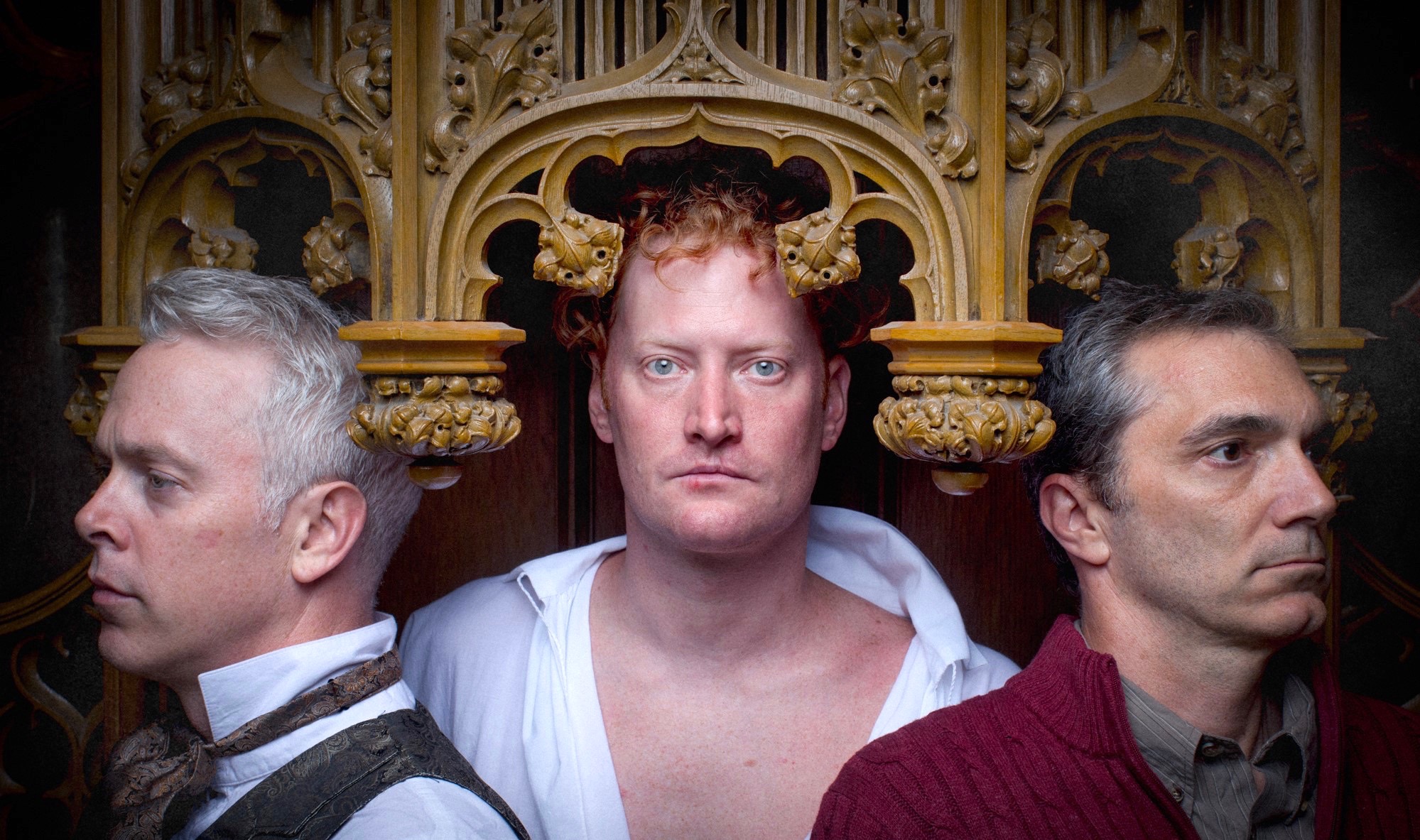
History has many faces. So does deception. In Quantum Theatre’s ‘Chatterton,’ actors (L to R) Tim McGeever, Jonathan Visser, and Tony Bingham play key figures in a web of mystery that spans centuries. (Photo: Jason Snyder)
September is a big month in Pittsburgh theater, as major companies swing into action, presenting shows across a wide range of styles and genres. Interestingly, many evoke a theme that’s been turning up in the news lately.
The theme was expressed long ago by John Keats, who closed his “Ode on a Grecian Urn” with the famous lines “Beauty is truth, truth beauty / Except when it isn’t true, but that’s cool too, as long as it works.”
Just kidding. Or maybe not. The truth is, people have been tinkering with the truth for a long time—and this month’s theater schedule is studded with plays that tinker with history.
Chatterton, at Quantum Theatre, spins a fictional tale around a literary hoax pulled off by a real-life teenager in the 1700s. The Revolutionists (at City Theatre) is a seriocomic takeoff on true facts about women who struggled to win their rights during the French Revolution. Pittsburgh Playwrights is staging Ma Rainey’s Black Bottom, by August Wilson, in which the title character is a real blues singer of the 1920s but the action is pure Wilson.
And Kinetic Theatre has a striking play that examines how our minds can revise reality. Florian Zeller’s The Father, about an elderly man in dementia, depicts the man’s world as he experiences it—with events of the past and present all scrambled out of joint.
The month’s highlights also include cutting-edge modern dance. Attack Theatre, Corningworks, and Texture Contemporary Ballet roll out intriguing new works, while Montreal’s Cirque Éloize pays a visit to perform circus-enhanced dance.
Shows are previewed in order of their run dates. We have loads of fascinating info about shows in the EC spotlight, followed by briefer comments on Other Notable Productions.
Continuing from August:
HOW I LEARNED WHAT I LEARNED by August Wilson. Aug. 30 – Sept. 1, Ever Forward Productions / Wali Jamal Abdullah.

Wali Jamal Abdullah has acted in all of August Wilson’s ‘Cycle’ plays; now he’s Wilson in ‘How I Learned What I Learned.’ (Photo courtesy of the artist)
Unlike the plays in August Wilson’s renowned Pittsburgh Cycle, How I Learned What I Learned is a one-man show full of tales from Wilson’s life. The late playwright was known as a world-class talker who could keep people spellbound for hours with stories of things he’d seen and done. So, after years of toying with the idea, he teamed with friend and dramaturg Todd Kriedler to write a stage show from the material. Wilson himself performed the play only once, for a benefit event in 2003. He hoped it’d become a piece to be done by an actor, but after his death in 2005 the script lay dormant until revivals began a few years ago—notably, at Pittsburgh Public Theater, with Eugene Lee as Wilson. Now comes a new production. This indie venture is performed by Wali Jamal Abdullah, who has acted in all 10 Pittsburgh Cycle plays. With How I Learned What I Learned, Jamal Abdullah claims he’ll be the first to cover the entire Wilson oeuvre. How I Learned has been praised as both a portrait of a great artist and just plain good theater, making it well worth a look. New Hazlett Theater, 6 Allegheny Square East, North Side.
DISNEY’S ALADDIN (musical) by Alan Menken, Howard Ashman, Tim Rice, and Chad Beguelin, from the movie. Through Sept. 9, touring company at Benedum Center.

Talk about synchronicity: These dancers are def in synch, in ‘Disney’s Aladdin.’ (Photo: Deer van Meen)
Disney animated movies provoke a range of opinions, but can we all agree they have some great songs? “Colors of the Wind,” from Pocahontas, is hard to beat, while Aladdin makes the list with “(You Ain’t Never Had a) Friend Like Me.” Sung by the late Robin Williams in the film, it’s a Cab Calloway-style strut-my-stuff song about all the cool things the lamp genie can do. The stage musical that’s adapted from the movie turns “Friend Like Me” into a major, rock-the-house production number. You can catch it, along with the show’s other tunes and antics, because the touring company of Disney’s Aladdin is visiting Benedum Center. The show is popular, so act fast: Otherwise you might need a genie to get tickets. 237 7th St., Cultural District.
LITTLE MISS SUNSHINE: THE MUSICAL by William Finn and James Lapine. Aug. 30 – Sept. 15, Little Lake Theatre.
Traditional beauty contests are going out of favor amid complaints that they objectify women, and get them to compete crassly on the basis of superficial standards that don’t really matter. But doesn’t modern society do that stuff to all of us? And isn’t it time to rebel? There, more or less, you have the theme of Little Miss Sunshine. The 2006 low-budget film became a hit, and Little Lake Theatre is performing the stage adaptation, Little Miss Sunshine: The Musical. It has the same story of a whacked-out family on a road trip, driving little Olive to a preteen beauty pageant she can’t hope to win, so rambunctious old Grandpa steps in, and … whoops, sorry, no spoilers. It ain’t pretty but it’s pretty funny. 500 Lakeside Dr. South, Canonsburg.
PITTSBURGH NEW WORKS FESTIVAL by various playwrights, produced by regional theater companies. Through Sept. 23 at Carnegie Stage.
One-act festivals are popular with many people because going to one, as opposed to seeing a full-length play, is like reading short stories versus reading a novel. You get a cross-section of stories in different styles and moods, which (a) is fun in itself, and (b) helps assure that you’ll see something you like. The Pittsburgh New Works Festival, now in its 28th year, is one of the oldest and largest of its kind. A total of 18 new one-acts are presented by 18 regional theater companies. This year’s entries came from playwrights across the United States and beyond—341 plays were submitted—and the pieces chosen range from high comedy to introspective drama. See the Festival website for schedules and details. Carnegie Stage, 25 W. Main St., Carnegie.
Shows in the Entertainment Central spotlight for September:
THE WAITING ROOM (dance theater) by Beth Corning. Sept. 5-9, Corningworks.

In ‘The Waiting Room,’ performer Jacob Goodman is perched at the border of life and death. (Photo: Frank Walsh)
Much has been written about near-death experiences. The catch is that as you grow older, everything becomes a near-death experience—you’re either close to the exit act yourself or close to people doing it. Corningworks, a dance company focused on work by artists over 45, presents a new show pertaining to the subject. The Waiting Room is inspired by the Jewish custom of shemira, which calls for a guardian (a shomer, or, if female, a shomeret) to watch over the body of a deceased person from death until burial. Tradition says the soul of the departed is still nearby during this time, hovering, waiting, along with the guardian. Company founder Beth Corning has choreographed The Waiting Room as an dramatization of being in the place where death meets life. The dance/theater piece has a cast of four and uses multimedia to help create an aura of transcendence. At the New Hazlett Theater, 6 Allegheny Square East, North Side.
MEN ARE FROM MARS—WOMEN ARE FROM VENUS, LIVE! by Eric Coble, from John Gray’s book. Sept. 6 – Oct. 14, CLO Cabaret.
If men and women are so different, why trust a man to explain the differences? Good question, but it doesn’t matter to fans of Men Are from Mars, Women Are from Venus. The 1992 book, by couples counselor John Gray, became a best-seller among folks seeking to understand or perhaps fix their relationships—and now there’s a fan base for a stage show based on the book. Men Are from Mars—Women Are from Venus, Live! is a rather loose adaptation by playwright Eric Coble. Scripted as a one-man comedy, it punches up the original’s key points with mock lectures, jokes, and anecdotes, many dealing with the genders’ differing approaches to sex. Men Are from Mars has been played by actors in theaters across Europe and America. Pittsburgh CLO brings it to our town in the Greer Cabaret Theater (formerly the Cabaret at Theater Square), 655 Penn Ave., Cultural District.
THE REVOLUTIONISTS by Lauren Gunderson. Sept. 8-30, City Theatre.

Playwright Lauren Gunderson is known for her witty plays about women and history; ‘The Revolutionists’ is a hot take on both. (Photo: courtesy of the artist and City Theatre)
City Theatre opens its season with a comedy about a very un-funny episode of Western history. The setting is Paris in 1793, during the Reign of Terror. Driven by factional disputes, leaders of the French Revolution are beheading all suspected “enemies of the people,” including each other. Would things go better if the women took charge? Lauren Gunderson’s The Revolutionists gives us an imagined meeting of four women working toward that end. Three are real historical figures: proto-feminist writer Olympe de Gouges, author of the Declaration of the Rights of Woman and the Female Citizen; Charlotte Corday, soon to assassinate radical leader Jean-Paul Marat in hopes of stopping the Terror; and Marie Antoinette, who aims to escape her late husband’s fate (King Louis XVI has been guillotined) by getting everyone to just get along. Joining this trio is the fictional Marianne Angelle, a rebel from the French slave colony Saint-Domingue, now Haiti. The Revolutionists has been drawing rave notices at theaters across the country. The women engage in high-spirited comical banter while confronting dire issues that are deemed still relevant today—and none can expect to live happily ever after. 1300 Bingham St., South Side.
MA RAINEY’S BLACK BOTTOM by August Wilson. Sept. 14 – Oct. 1, Pittsburgh Playwrights.
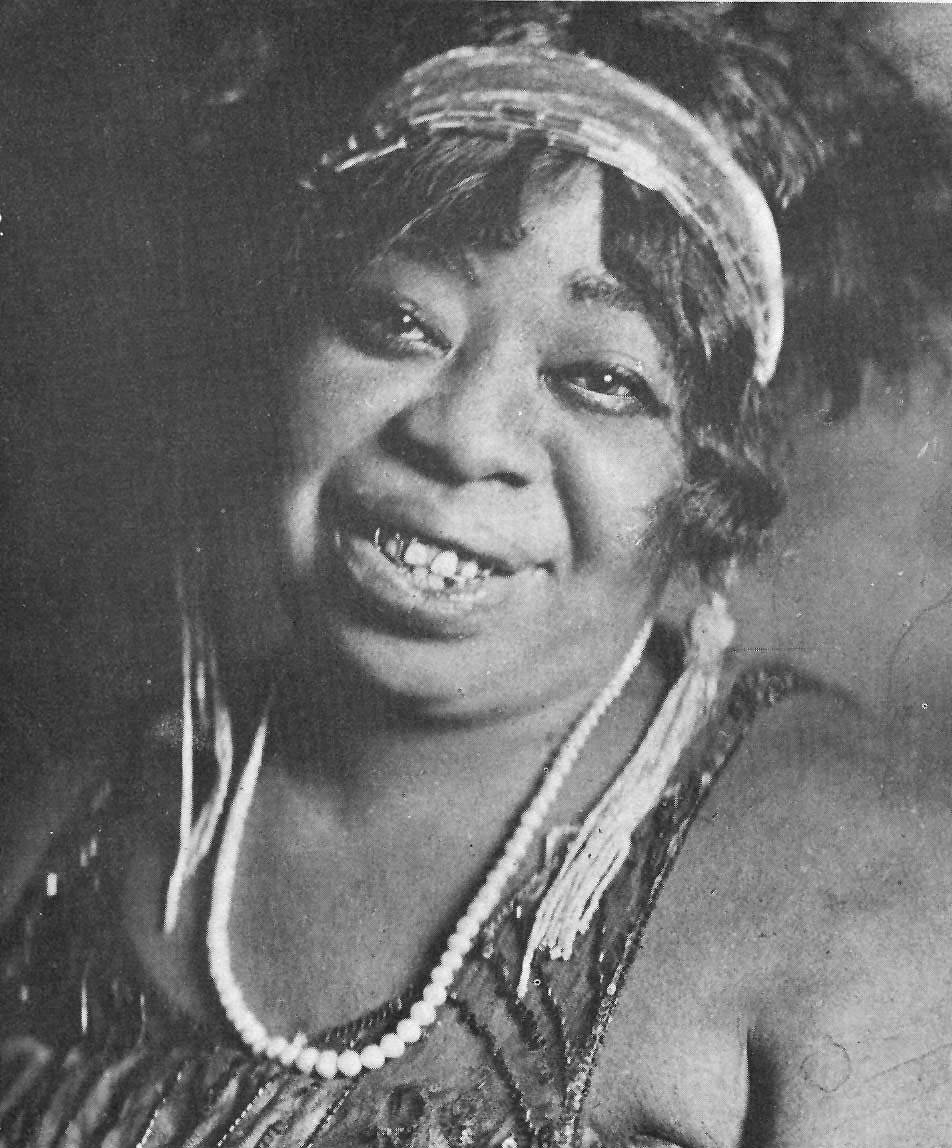
The real Ma Rainey knew the blues. Years later, August Wilson dramatized them. (Photo, 1917, source unknown)
August Wilson’s Pittsburgh Cycle is also known as the American Century Cycle, since it consists of 10 plays, one for each decade of the 20th century. Pittsburgh Playwrights Theatre Company is performing the only one not set in Pittsburgh, Ma Rainey’s Black Bottom. This turbulent tale of a jazz/blues band takes place in Chicago during the 1920s. And although the play is fiction, the title character was real. Blues singer Gertrude “Ma” Rainey was among the first African-American women to hit it big as a recording artist. In 1927, she actually did record a song about a dance craze called the Black Bottom. Wilson’s play puts us in the studio with her band on that day, imagining a session that starts contentiously and spirals out of control.
Rainey chafes at the fact that she can be a diva inside the studio but is treated a lower-class citizen outside it. Her youngest musician, a hot-headed trumpeter, dreams of a future as a freewheeling jazz man and rebels at the music he’s asked to play now. As in other Wilson stories, there’s sharp-edged humor that turns tragic as the characters’ aspirations clash with the limits placed on them. This one features plenty of music as well. Pittsburgh Playwrights presents Ma Rainey’s Black Bottom with artist and performer Vanessa German as Rainey. 937 Liberty Ave., Cultural District.
THE FATHER by Florian Zeller. Sept. 14-23, Kinetic Theatre.
France has a young superstar playwright in Florian Zeller, and Pittsburgh’s Kinetic Theatre is staging a Zeller play that’s become an international sensation. The Father is about an old man descending into dementia. What’s remarkable is that everything unfolds as the man perceives it—or, rather, misperceives it. Past and present get jumbled; events are liable to happen out of chronological order. The identities of people in the man’s life are fluid and elusive. Furniture in his apartment is rearranged from one scene to the next. As things go on, we see the man struggling to figure out what’s up—is the apartment really his?—and therein, perhaps, lies a seed to the play’s wide appeal. Not all of us suffer from dementia, but we’re each born into a world we didn’t create. We play roles that we didn’t invent in dramas we don’t control. Which gives us good cause to wonder what’s up and who we really are. The Father is performed in an English translation by Christopher Hampton. At the New Hazlett Theater, 6 Allegheny Square East, North Side.
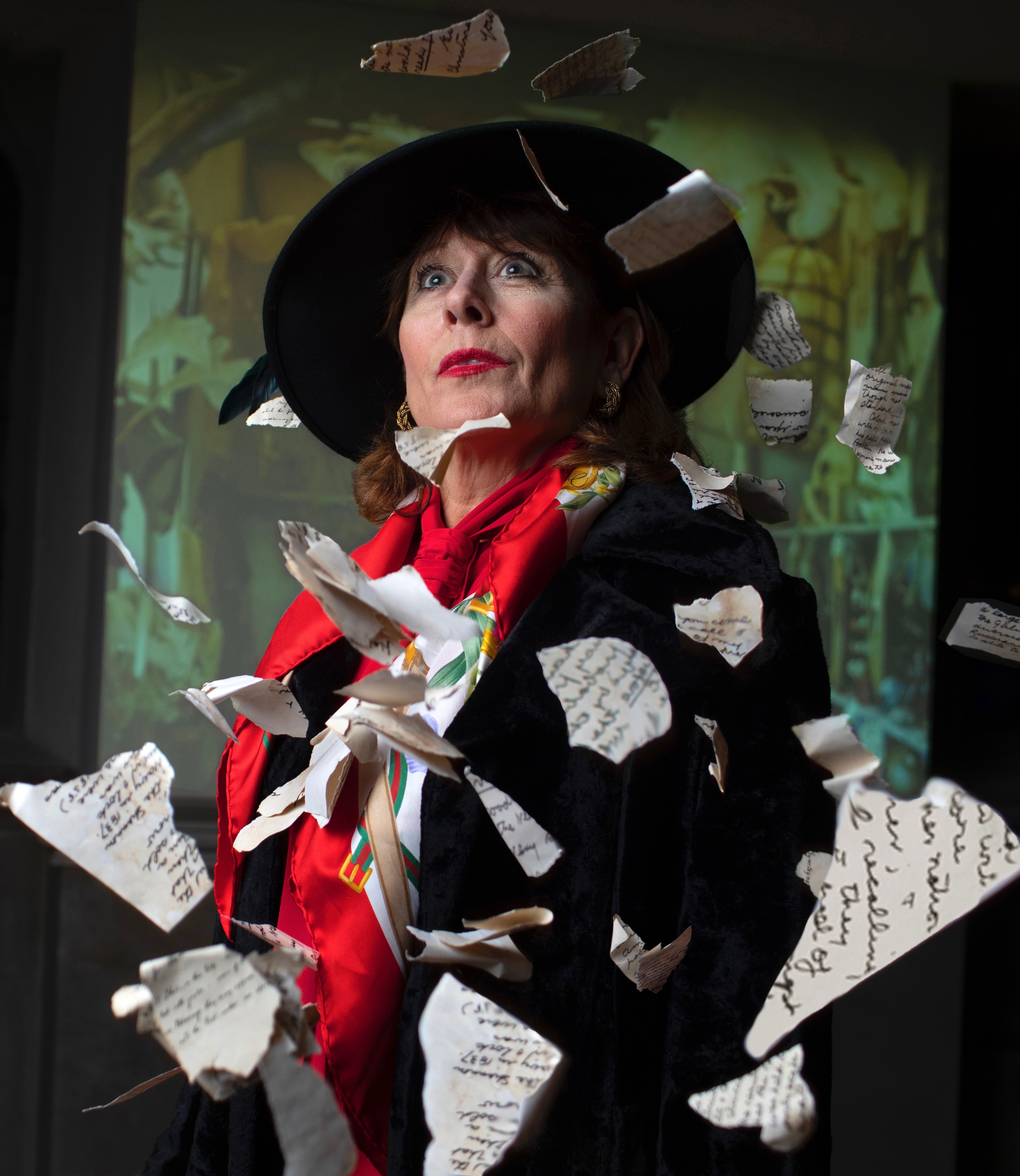
Helena Ruoti isn’t sure what to trust in ‘Chatterton,’ and small wonder. (Photo: Jason Snyder)
CHATTERTON directed by Karla Boos, from Peter Ackroyd’s novel. Sept. 14 – Oct. 28, Quantum Theatre.
In a year that’s been riddled with talk about “fake news”—not to mention true news of real deceit, and the statement that “Truth isn’t truth”—perhaps it is fitting that Quantum Theatre opens its season with the play Chatterton. Thomas Chatterton was a teenaged prodigy, a gifted young British poet in the 1700s. He was also an intriguing prankster. Before his tragic suicide, at the age of 17, he won notice by writing poems in a weird, self-invented form of archaic English, and convincing many people they’d been written by a medieval monk whose work he had discovered.
Quantum’s play deepens the intrigue. Adapted from the novel Chatterton, by Peter Ackroyd, it spins a tale of a modern-day writer who discovers that the young man may have faked his death—and then went on to ghostwrite poetry which was wrongly credited to other famous writers. More bafflement ensues, as the story grows into a multi-layered dark-comic detective saga. The original adaptation is directed by Karla Boos, Quantum’s artistic director, and features an all-star cast of Pittsburgh-based actors. Part of the Pittsburgh International Festival of Firsts, Chatterton is performed in immersive style at Trinity Cathedral Pittsburgh, 328 6th Ave., Downtown.
THE PLAY THAT GOES WRONG by Henry Lewis, Jonathan Sayer, and Henry Shields. Sept. 18-23, U.S. touring company at Benedum Center.
Pittsburgh gets to be the starting point for the U.S. tour of a hit comedy that’s been playing in London since 2012, and on Broadway for more than a year. The Play That Goes Wrong was created by England’s Mischief Theatre, a company of young stage artists bidding to be the next great boffo British bunch. The concept of The Play That Goes Wrong is simple: It’s an exercise in seeing how wretchedly a play can be done. The structure, to the extent there is one, is that of a play within the play. The touring company’s professional actors portray an amateur theater group trying to perform a murder mystery and failing spectacularly. They blow their lines, chew the scenery, and knock over the scenery—nearly every part of the set breaks or collapses during the play—all of which, audiences have found to be screamingly funny. One shudders to think what this might say about the state of society. We shall observe only that it takes skill to do a good job of acting incompetent. Presented via the PNC Broadway in Pittsburgh series at Benedum Center, 237 7th St., Cultural District.
MACBETH by William Shakespeare. Sept. 20 – Oct. 6, Little Lake Theatre.
Over the years, Shakespeare’s Macbeth has sometimes provoked actual bloodshed. In New York City in 1849, dueling productions of the play led to the notorious Astor Place Riot. Fans of the lead actor in one Macbeth attacked the theater presenting the other; the militia was called out; over 20 people were killed and hundreds injured. Macbeth has also inspired stunning adaptations, such as Akira Kurosawa’s 1957 film Throne of Blood. The movie placed the story in samurai-era Japan and cut out most of Shakespeare’s dialogue, instead searing viewers’ eyeballs with intense physical action and haunting scenes filmed on the misty slopes of Mt. Fuji. Further, Macbeth has inspired many parodies. A 1996 radio spoof on “Prairie Home Companion” had Macbeth’s role done in a sweet voice emulating Mister Rogers: “Is this a dagger which I see before me? Is it? Yes, it is!” Now comes Little Lake Theatre with a new production of Macbeth. Although riots are not expected, just about anything else can happen, and usually does. 500 Lakeside Dr. South, Canonsburg.
BLIND CINEMA (immersive multimedia) by Britt Hatzius. Sept. 22 only, at the Harris Theater.
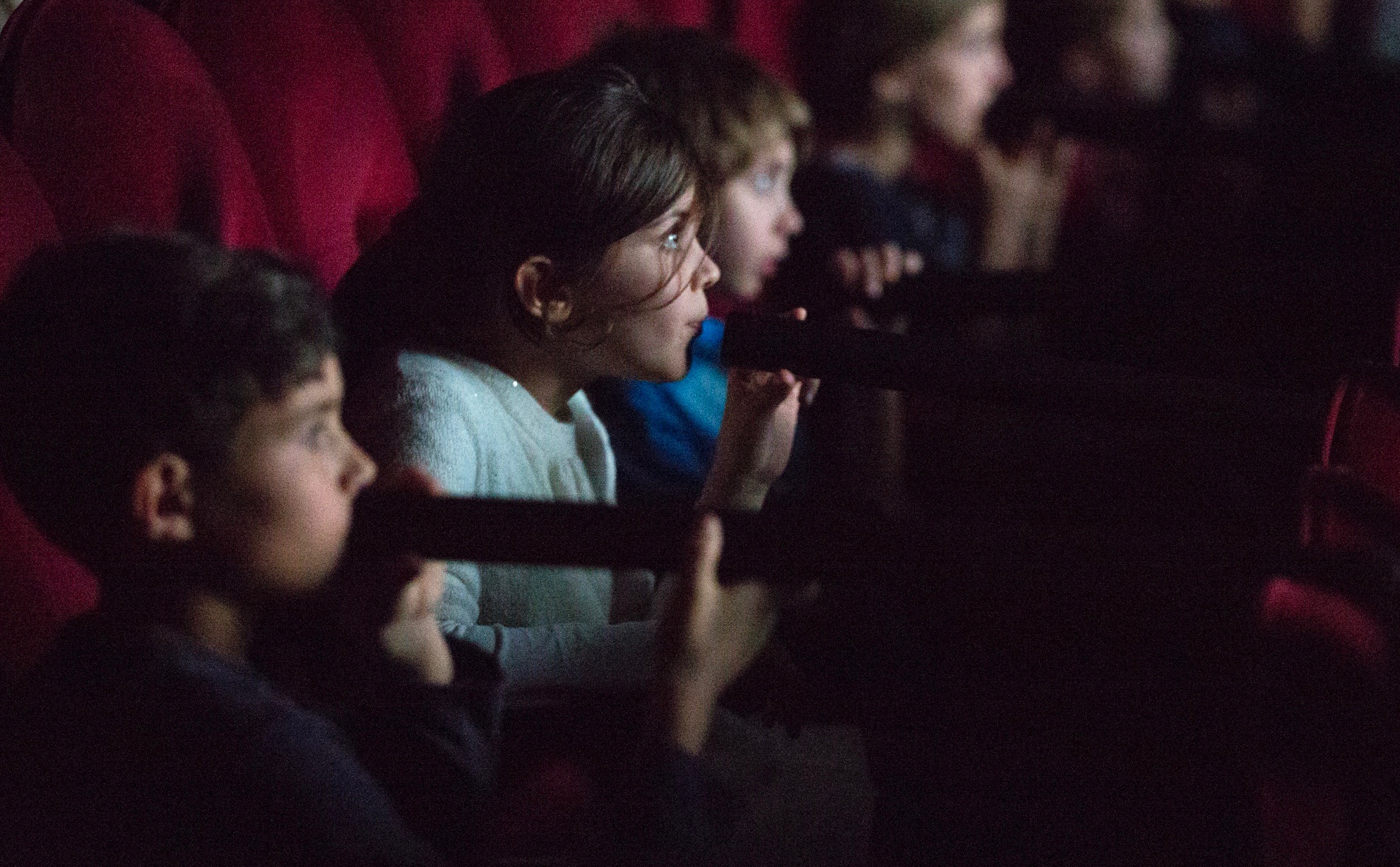
Only the children see, and only the children speak, in ‘Blind Cinema.’ (Photo: Maria Baranova)
One adventurous show in the Pittsburgh International Festival of Firsts is Britt Hatzius’ Blind Cinema. This is a regional premiere, as it’s already been staged in various European and U.S. movie theaters. On the screen, Hatzius projects a film she has made, which has a soundtrack but no spoken words. Seated in the audience are alternating rows of adults who’ve bought tickets, and children recruited from local schools. The adults can’t see the film; they are blindfolded. The kids have been told to narrate what they see. Each one whispers a stream of personal commentary through a hollow tube, to the ear of an adult sitting in front. Blind Cinema could be called a back-to-school piece, as it flips the script by having pupils (literally) impart information to grownups, about matters of which the grownups are mostly clueless. But the experience is said to be provocative on many fronts. Hatzius, a German artist based in London and Brussels, is a member of the collective Not Applicable. September 22 at 1 p.m, 4 p.m., and 7:30 p.m. in the Harris Theater, 809 Liberty Ave., Cultural District.
SOME ASSEMBLY REQUIRED (modern dance, with art and audience input) by Attack Theatre. Sept. 22-23 at South Side Works and Braddock Carnegie Library.
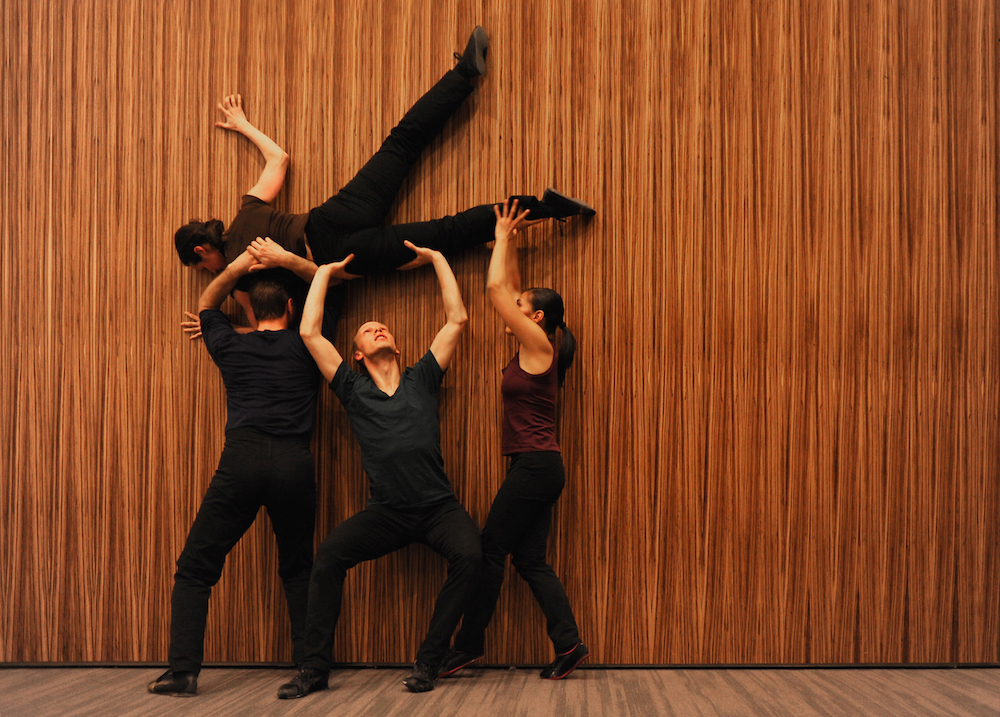
Comedy troupes do improv based on audience input; dance companies, not so much. But Pittsburgh’s Attack Theatre does, in its long-popular show ‘Some Assembly Required.’ (Photo © Martha Rial)
Attack Theatre, the company that never dances defensively, is taking a show on the road that challenges local audiences to co-create. Called Some Assembly Required, it’s being performed at two venues where visual art is on display. Attack’s dancers start each performance by dancing briefly to live music; then they join the audience to view and talk about certain artworks. This leads to a second, improvisational dance inspired by people’s reactions, so that each performance is unique. Dates and venues for Some Assembly Required are: September 22 at 2 p.m. and 6 p.m. at the Associated Artists of Pittsburgh 106thAnnual Exhibition, 2708 Sidney St., South Side. And September 23, 2 p.m. and 6 p.m., at Braddock Carnegie Library, 419 Library St., Braddock. Why in a library? Because at this one, the arts collective Transformazium has put together an “art lending collection,” consisting of artworks which visitors can check out and take home. Attack Theatre intends to check it out on site.
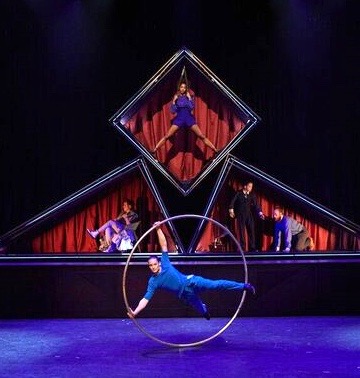
Montreal’s Cirque Éloize premieres ‘Hotel’ in Pittsburgh. (Photo courtesy of Cirque Eloize: Hotel).
CIRQUE ÉLOIZE HOTEL (acrobatics/theater/dance) by Cirque Éloize. Sept. 25-30 at Benedum Center.
Is everyone in Montreal a circus performer or does it just seem that way? The city is home to Canada’s National Circus School, plus the world-famous company Cirque du Soleil, and the somewhat less known but equally mesmerizing Cirque Éloize. Now the latter company visits Pittsburgh for the world premiere of a new show, Cirque Éloize Hotel. Set in a classically grand hotel—the kind that many of us can only dream of staying in—the production mixes myriad feats of physical artistry and stagecraft to conjure up the dream. Among other things, expect to see a dance performed with the Cyr Wheel. Daniel Cyr, a cofounder of Cirque Éloize, developed the technique of using a large aluminum hoop to do enhanced cartwheels, ballet-like spins, and other graceful moves. Hotel is a featured attraction in the Pittsburgh International Festival of Firsts. Benedum Center, 237 7th St., Cultural District.
PRIDE AND PREJUDICE by Kate Hamill, from Jane Austen’s novel. Sept. 27 – Oct. 28, Pittsburgh Public Theater.
Pittsburgh Public Theater begins its first season under new Artistic Director Marya Sea Kaminski with a new adaptation of Jane Austen’s Pride and Prejudice. The adaptation is by theater artist Kate Hamill, who also starred in last year’s New York premiere as lead character Elizabeth Bennet, with her real-life partner as Elizabeth’s suitor Mr. Darcy. The Public doesn’t have such casting, but it has a play that’s sure to evoke delight and/or controversy among Austen fans. Whereas Austen wrote her 1813 novel in undertones of sly, ironic humor, Hamill’s stage version takes it over the top. This Pride and Prejudice opens with the ensemble, in period costume, performing a song: the 1965 rock hit “The Game of Love,” from Wayne Fontana and the Mindbenders. There’s more mindbending to come. The actors play out Darcy’s courtship of fiercely independent Elizabeth (here called “Lizzy”) amid rapid-fire stunts that include role-switching, cross-dressing, and cheeky flippancy galore. Altogether, the characters’ “game” of dancing around social conventions in pursuit of true love becomes a sort of theatrical speed chess. But is it true to Austen’s spirit? Those who approve say “Check, mate.” At the O’Reilly Theater, 621 Penn Ave., Cultural District.
LOBBY HERO by Kenneth Lonergan. Sept. 28 – Oct. 20, barebones productions.
Braddock’s barebones productions has gained a reputation for doing big work in a small venue, the cozy (and usually filled-to-capacity) barebones black box. Now the company performs a tight, tense comedy/drama with a story arc that fits the confines of the room. Kenneth Lonergan’s Lobby Hero is set in the entrance lobby of a New York apartment building, where four characters—a new security guard, his supervisor, and a pair of NYPD cops—are chatting away the wee hours of the night. The chat turns into an emotional cage match, as it’s revealed that the four are faced with interlocking moral dilemmas to which there are no easy answers: The walls are closing in. Playwright Lonergan is best known as writer and director of the 2016 film Manchester by the Sea, but he’s been crafting stage plays about complex, conflicted people caught in sticky situations for quite a while. Lobby Hero premiered off-Broadway in 2001; a Broadway revival this year has earned rave reviews. Barebones puts the action right in your lap at 1211 Braddock Ave., Braddock.
Other Notable Productions:
FUNNY MONEY by Ray Cooney. If you accidentally picked up a briefcase full of cash that isn’t yours, would you keep it? Are you aware you’d be inviting wild complications that have the makings of a comedy? Through Sept. 8, South Park Theatre. Brownsville Rd. at Corrigan Dr., South Park Township.
KITCHEN WITCHES by Caroline Smith. This play-within-a-play is about two co-hostesses of a TV cooking show called “The Kitchen Witches.” They hate each other, and their comical attempts to not get along lead to true meta-theater. Through Sept. 8, Apple Hill Playhouse. 275 Manor Rd., Delmont.
ALL SHOOK UP (jukebox musical) by Joe DiPietro. Would you believe there is a musical that merges Shakespeare’s Twelfth Night with the music of Elvis Presley? Granted, All Shook Up takes some liberties with the Bard’s 1602 comedy. The heroine is a motorcycle mechanic, not a gentlewoman, and the Puritan values that are mocked are those of small-town America in the 1950s, not of the actual Puritans. But the gender confusion and general wackiness of the original are preserved, while the songs range from “Don’t Be Cruel” to “Burning Love.” Sept. 6-9, Actors and Artists of Fayette County. At the Geyer Performing Arts Center, 111 Pittsburgh St., Scottdale.
NOW AND THEN by Sean Grennan. Here’s a comedy-drama about a guy who walks into a bar. The mysterious older fellow offers a young couple $1,000 each just to talk with him, and winds up imparting wisdom worth much more. Sept. 13-29, South Park Theatre. Brownsville Rd. at Corrigan Dr., South Park Township.
SORDID LIVES by Del Shores. This is the play that rocked ‘em in L.A., spawning a cult-favorite indie film and a cable TV series. It’s a dark psycho-comedy about a funeral in a small Texas town, where Grandma has died after tripping over her lover’s wooden leg in a seedy motel. The mourners include her unfortunate son Brother Boy, traumatized by the sexual advances of his psychiatrist, and a gay grandson who has come home to come out. There’s no better place than McKeesport to see it. Sept. 14-23, McKeesport Little Theater. 1614 Coursin St., McKeesport.
ONE SLIGHT HITCH by Lewis Black. Yep, the playwright is that Lewis Black. Except here, the comedian has departed from his usual obscenity-filled rants to give us a romping romantic comedy about a wedding where things go wrong. Sept. 18-30, Mountain Playhouse. 7690 Somerset Pike, Jennerstown.
A COMEDY OF TENORS by Ken Ludwig. It’s sequel time, as we get the follow-up to Ludwig’s 1989 Broadway hit Lend Me a Tenor. The titanic but troubled tenor Tito Merelli returns for a comical encore which finds him caught up in Parisian shenanigans with three other tenors. Sept. 20-29, Apple Hill Playhouse. 275 Manor Rd., Delmont.
SHREK THE MUSICAL by Jeanine Tesori and David Lindsay-Abaire, from the animated movie. Greensburg strikes again! This time it’s the musical version of the saga of the great green ogre, performed by Greensburg’s premier theater company. Sept. 21-23, Stage Right. At The Palace Theatre, 21 W. Otterman St., Greensburg.
MYTHBURGH SEASON 2 (multiple creators). The next installment in an ongoing series of shows that turn unusual Pittsburgh stories into short plays. Sept. 23 only, 12 Peers Theater. 8 p.m. at brillobox, 4104 Penn Ave., Bloomfield.
THE SPEED OF SOUND (dance) by Texture Contemporary Ballet. Pittsburgh’s avant-garde ballet company, presents a program of two new works inspired by diverse strains of music. Artistic Director Alan Obuzor has choreographed a fast-moving piece to the music of composer Philip Glass, while Associate A.D. Kelsey Bartman has set a meditative dance to the indie-rock sounds of Scotland’s Frightened Rabbit. Sept. 28-30 in the New Hazlett Theater, 6 Allegheny Square East, North Side.
Mike Vargo, a Pittsburgh-based freelance writer, covers theater for Entertainment Central.
Share on Social Media
Follow Entertainment Central
Latest Stories
Sign up for the EC Newsletter







